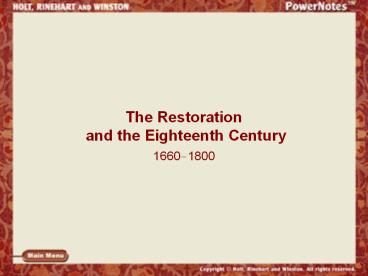The Restoration and the Eighteenth Century - PowerPoint PPT Presentation
Title: The Restoration and the Eighteenth Century
1
The Restoration and the Eighteenth Century
- 16601800
2
Leading Up to 1660
3
The Restoration
- During Charles IIs reign (16601685),
- the Church of England regained its power
- the life of the aristocratic courtier became the
model for a sophisticated age of taste and luxury
- theaters reopened and censorship of the arts
declined - religious persecution of Catholics and Dissenters
by Anglicans became widespread
4
Enlightened England
- The period from 1660 to 1800 in England is known
as the Enlightenment, the Age of Reason, the
Augustan Age, or the neoclassical period. - This period brought many changes to
- society
- science
- religion
- literature
5
Society
- The rich lived lavishly. They
- attended newly reopened theaters
- wore expensive, heavily ornamented clothing
- used make-up and wore heavy wigs that extended
high over their heads (both men and women) - attended or hosted balls, masquerades, and
dinners in London and in fashionable resort
cities such as Bath
6
Society
Conditions for the poor of Englands great cities
deteriorated. The poor
- lived in filthy, overcrowded slums
- suffered from poor sanitation and disease
- were often sent to debtors prisons
- had access to cheap gin and had high rates of
alcoholism
7
Science
Advances in science led to a better understanding
of nature and its laws.
- Sir Isaac Newton published his groundbreaking
Mathematical Principles of Natural Philosophy. - Robert Hooke contributed to the fields of
astronomy, biology, chemistry, and physics. - Robert Boyle laid the foundation for the study of
chemistry.
8
Religion
- Catholics and Dissenters (members of non-Anglican
Protestant churches) were persecuted. - Many Dissenters immigrated to other countries in
search of religious freedom. - Deists, believers of a new and controversial
religious doctrine, viewed the universe as a
perfect mechanism that God had built and then
left to run on its own.
9
LiteratureDrama
- Drama was very popular during the Restoration and
the eighteenth century. - Female actors were allowed on stage.
- Comedies of manners reflected the life of the
rich and leisured classes. - Heroic dramas entertained audiences with
melodramatic devicesexaggerated dialogue,
emotional outbursts, and stereotypical characters.
10
LiteratureProse
- Scientists developed a more precise style of
writing than their Elizabethan predecessors. They
- avoided ornate metaphors and allusions
- used shorter, more concise sentences
- Essayists and journalists developed a prose style
pleasing to middle-class readers, rather than the
aristocracy. They - addressed political and social matters and sought
reform - established periodicals such as The Tatler and
The Spectator
11
LiteraturePoetry
- Neoclassical poetry
- appealed to the intellect and reason more than to
emotions - was often witty and filled with classical
allusions - had a public useto celebrate, mourn, or ridicule
- followed strict rules of form, rhyme, and meter
- popular poetic forms odes, elegies, and satires
True Ease in writing comes from Art, not
Chance, As those move easiest who have learnd to
dance. from An Essay on Criticism by Alexander
Pope
12
LiteratureSatire
- Eighteenth-century English writers excelled in
satirea kind of writing that ridicules human
weakness, vice, or folly in order to bring about
social reform. - Alexander Pope gently satirized the immorality
and bad taste of the leisured classes in works
such as The Rape of the Lock. - Jonathan Swift harshly satirized the hypocrisy
and smugness of human behavior in works such as
Gullivers Travels.
13
LiteratureThe Novel
- The novel form came into being in the eighteenth
century and was immediately popular.
Eighteenth-century novels - described middle-class life and were often earthy
and comical - explored the emotional lives of characters in
detail - Epistolary novels, in which the story is told in
a series of letters, were also popular.
14
What Have You Learned?
1. After Oliver Cromwell died, _________ was
restored to the throne in 1660. a. Elizabeth b.
Henry VIII c. Charles II 2. Members of
non-Anglican Protestant churches were persecuted
during the Restoration. a. True b.
False 3. The ______ was a new literary form
developed during the eighteenth century. It
explored the emotional lives of characters in
detail. a. letter b. novel c. sonnet
15
The End

